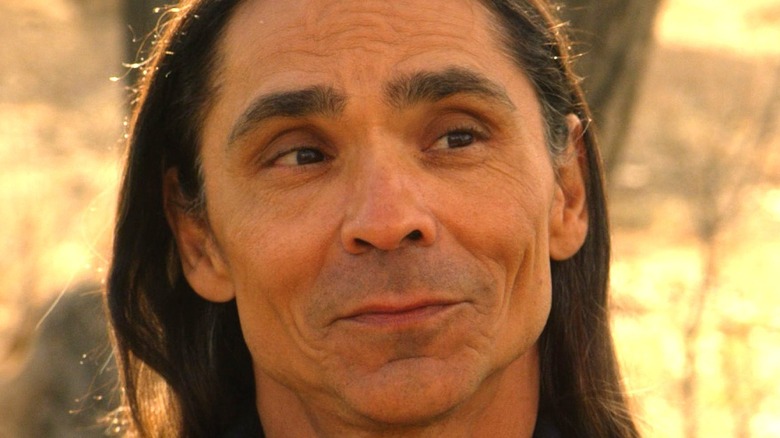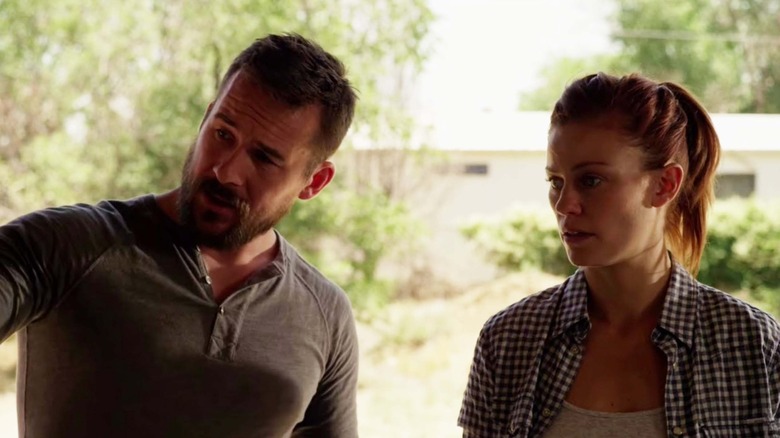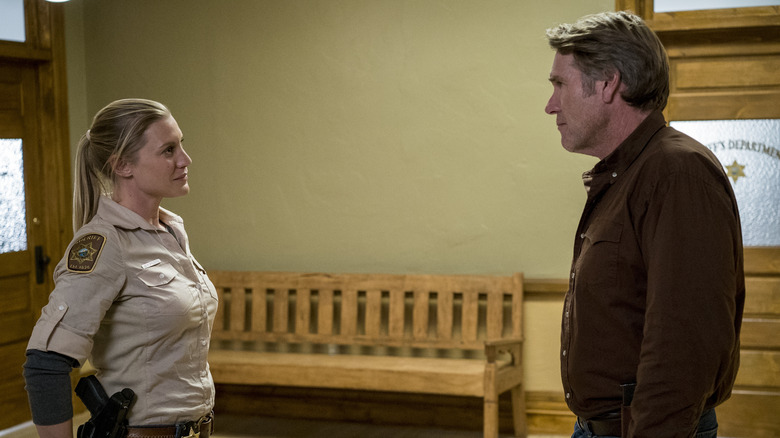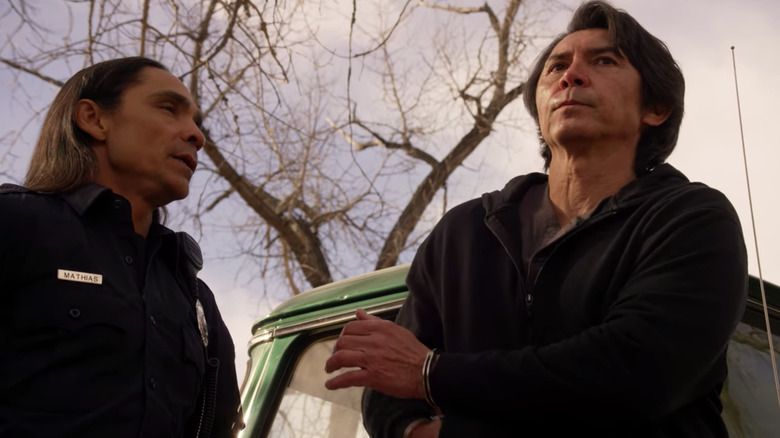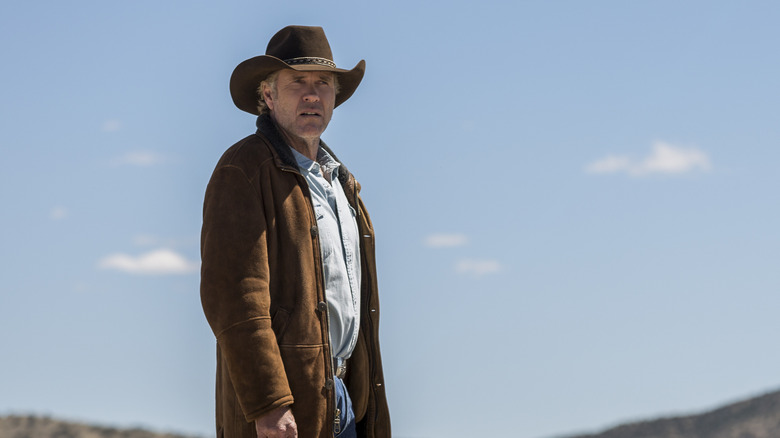Things You Only Notice In Longmire After Watching It More Than Once
Considered one of the best ever "dad shows," "Longmire" premiered on A&E in 2012 and quickly became the highest-rated original drama series on the network (per Variety) before moving to Netflix for its final three seasons. A modern Western crime mystery, "Longmire" is based on the "Walt Longmire Mysteries" series of novels by Wyoming-based author Craig Johnson, who has published nearly 20 different novels (not including the other short stories or novellas) following Sheriff Walt Longmire as he protects the fictional Absaroka County.
But regardless of where Walt Longmire's journey began, most know and love the version played by Robert Taylor in the hit Western series. Alongside Taylor, "Longmire" stars Lou Diamond Phillips as Henry Standing Bear, Katee Sackhoff as Deputy Vic Moretti, and Cassidy Freeman as Walt's daughter Cady, among a host of other loveable characters. As the series continued, fans anxiously awaited each new episode, and while "Longmire" certainly followed some long-running threads, we mostly just loved the weekly murders and mysteries.
In a world of television currently ruled by the likes of the hit Paramount series, "Yellowstone" – which includes "Longmire" co-creator John Coveny as one of its early producers — shows like this owe Walt Longmire and the gang its thanks for blazing the trail for the return of the contemporary Western to television. But even some of the most devoted "Longmire" fans may have missed a few things throughout the series' run that can go unnoticed unless you've binged through Walt's adventures more than once.
There are a disproportionate number of murders in Wyoming
The world of "Longmire" is an exciting one, albeit a bit dangerous too. Though times and technology have changed, the fictional Absaroka County is basically the Wild West. Bordering the local Cheyenne Reservation and the state of Montana, Sheriff Longmire's territory is home to plenty of criminals, some just a bit more violent than others. Over the course of this six-season series, Walt and the gang investigate criminal conspiracies, kidnappings, thefts, cults, and oftentimes murders that just seem to keep on coming.
According to Grandland, the first two seasons alone produce a body count of 32 total deaths. Though only 27 of these are murders, that's still quite a bit of violence for a random county in middle-of-nowhere Wyoming. For some more perspective, the Wyoming murder rate has been on the decline since 2016, and it wasn't exactly high back then either. Naturally, as the show continues, more and more bodies stack up — including some beloved main cast members — but that never stops Walt from getting his man (and occasionally his woman).
For some, this sort of violence can take you out of the sometimes harsh realities that "Longmire" attempts to ground itself in. Though, as its contemporaries such as "Yellowstone" only get more violent with time, they better help us to appreciate how discreet "Longmire" is in terms of showing homicides and other violent crimes — even if Walt himself isn't always a peaceful man.
Walt is a well-read cowboy
While most cowboys and Western sheriffs are a bit rough around the edges, Walt Longmire is a different breed. No doubt, he's still got his fair share of quirks and tough spots — not to mention the trauma of uncovering his wife's murder — but he's still unique compared to other comparable characters such as Texas Ranger Cordell Walker from "Walker." Namely, Walt is a bit of a bibliophile, at least when it comes to the classics, and he's got quite the vocabulary too.
Walt has been found quoting William Shakespeare, John Donne, and even William Faulkner, and while that's not incredibly original, it shows that compared to most of his colleagues, he seems to read a fair amount. In Season 2, Episode 12 ("A Good Death is Hard to Find"), Walt threatens Ed Gorski (Lee Tergesen) by retelling the story of Achilles Homer's "The Iliad," and the Absaroka county sheriff takes his book trivia even further when he's interviewing new deputy candidates in Season 4, Episode 5 ("Help Wanted"). Here, Walt makes his candidates read — not watch — John Steinbeck's "Of Mice and Men" to better understand how they might react under similar pressures.
Walt's intimate knowledge of literature even influences his approach when handling certain members of the community — namely Bob Barnes (John Bishop), who is always getting himself into trouble. While most Western heroes tend to "shoot first," Walt's literacy has helped him become a more reasonable lawman than most.
Most of the cops have something of an anger problem
This isn't exactly exclusive to "Longmire" since many other cop dramas discuss similar issues, but because of the small nature of Absaroka County Sheriff's Department, the lack of proper anger management stands out. While Walt is usually pretty good at locking down his own temper, there are multiple occurrences where he just loses it. Whether it's fighting his best friend in an open field, wailing on his own deputy in the middle of the road, or flipping over his desk, Walt gets kinda scary when he lets loose.
Unfortunately, most problems in leadership end up trickling down to those who follow, and that is certainly true for the rest of Walt's team. But, of all Walt's deputies, Branch Connally (Bailey Chase) has the most anger in him, especially towards a Cheneyne man named David Ridges (David Midthunder) who nearly killed him in the field. Branch's anger towards Ridges expands beyond the job, forcing Walt to take his badge, and Branch nearly loses his sanity. Unfortunately, Branch ends up doing more damage as a free agent.
Likewise, others such as Vic Moretti, Zach Heflin (Barry Sloane), and "Ferg" Ferguson (Adam Bartley) all struggle with their own rage issues as well, which either leads to a talking to from Walt, a pink slip, or a loss of a relationship. The rage issues are not without their consequences, which is probably a blessing given that everyone seems to struggle in that department.
The casino doesn't solve any of the issues on the Rez
While the entirety of "Longmire" pits Walt against Cheyenne local Jacob Nighthorse (A Martinez), the first few seasons see this rivalry circle around the building of a potential Indian casino on the local Cheyenne Reservation. Walt's wife Martha had fought Nighthorse on this for years prior to her untimely death ahead of the series premiere, which naturally meant that it was Walt's turn to pick up the pitchfork. In the end, Nighthorse won out, with empty promises that the casino would help the Cheyanne community restore themselves and their homeland.
At the series' end, it's eventually revealed that Nighthorse took some of the casino's earnings to pay off his own personal debts, which eventually disbars him from running the joint. But beyond his own private deceptions, Nighthorse's casino only makes the Cheyenne Reservation — and by extension all of Absaroka County — all the more dangerous. As the casino pulls in more out-of-staters, such as oil field workers from North Dakota, crime is just as bad as ever, and violence on the Rez continues unchecked.
There isn't a shortage of examples of how the casino directly impacts Walt's job as sheriff on the series, and it doesn't take long into Season 4 before more folks are murdered (or worse) as a result of the newcomers it brings in. You'd think with all his funds, Nighthorse could help his people in a better, less self-destructive way.
Walt is both wrong and right about Jacob Nighthorse
As mentioned above, Walt Longmire and Jacob Nighthorse don't exactly get along. In fact, they continue to struggle with each other throughout the entire series. From the very first season, Walt accuses Jacob of fraud, theft, and even murder. It doesn't take long before Nighthorse is an official suspect in the murder of Walt's wife based on his associations with the Dog Soldier and killer David Ridges. Admittedly, it does begin to look as if Nighthorse is involved — and technically he is, albeit indirectly — but on that account, he proves himself an innocent man.
Regardless of how many times Walt tries to throw Nighthorse under the bus with his baseless accusations, and no matter how shady the Cheyenne businessman seems, nothing ever seems to stick. But, as we alluded to earlier, in the show's final season, Nighthorse is revealed to have stolen casino funds for his own debts. This criminal act finally gives Walt the ammo he needs to put Nighthorse away. Despite that, by the series finale ("Goodbye Is Always Implied"), Walt and Nighthorse seem to finally make peace.
For as many times as Walt was wrong about Nighthorse, the show's forever red-herring eventually becomes a criminal. Whether he steps into this role because of Walt's bullying or due to his own mistakes is debatable, but what isn't is that our titular sheriff was both wrong and right about Nighthorse the whole time.
Cady has a thing for Sheriff's Deputies (and vice-versa)
Originally a lawyer, Cady Longmire ends her arc on the series with a new mission ahead of her as she decides to potentially take over her father's position as sheriff. Ignoring the fact that Cady has absolutely no law enforcement experience whatsoever, Cady has a strange history with local law enforcement. Well, not so much strange as it is complicated. Throughout "Longmire", Cady has been in relationships with not one but two of her father's own deputies: Branch Connally and Zach Heflin.
Though her romance with Branch was a bit rocky, especially given that Branch was gunning for Walt's job for a while there, it had a profound impact on Cady. Once Branch died, she was forced to reconsider some of her choices and career paths. This ultimately led to her budding relationship with Zach later on — who was keeping tabs on her safety per Walt's orders. By the time the series ends, Cady and Zach are a solidified item and partner up to campaign for Cady's run for office.
Beyond Branch and Zach, Ferg also held a torch for Cady for most of the show's run. Though he eventually starts dating a nurse named Meg (Mary Wiseman), Ferg wanted to make a move on Cady for years beforehand. Evidently, Walt's deputies need to learn a thing or two about personal and professional boundaries ... or maybe Cady just needs to stop visiting Walt at the office.
Vic's interest in Walt starts really early
By the ending of "Longmire," the will-they, won't-they between Walt and Vic finally comes to a head. After years of mourning his wife, and Vic's more recent loss of a child, these two finally find some solace and peace with each other and begin a real romantic relationship. Though some fans hated the ending, it seemed like the only way to give Vic a happy conclusion after the trauma she has endured. Admittedly, the romance between these two feels very forced, but that doesn't mean it's unprecedented.
Besides the fact that Vic is basically the same age as Walt's daughter, she had eyes for the reclusive sheriff from the very first season. Be it longing looks, flirty behavior, or just all the time they spent together on the job, it quickly became obvious that Vic had a thing for Walt. While Walt doesn't take an immediate romantic interest in her right off the bat, her infatuation with him becomes a recurring theme throughout the series.
In fact, Vic's ex-husband Sean (Michael Mosley), ex-lover Ed Gorski, and her own father — not to mention others such as Travis Murphy (Derek Phillips) — all call her out on it while also implying similar motives towards the sheriff himself. Despite the fact that the relationship between Walt and Vic occurs in the "Walt Longmire Mysteries" books, it feels less than organic in "Longmire." And that's putting it kindly.
The series was a trailblazer for Native representation
Before "Yellowstone" tackled issues on reservations, "Longmire" dealt with real-life issues that took place on Wyoming's Cheyenne Reservation — which, in real life, is actually located just north of the border in Montana. The series debates issues such as the usefulness of Indian casinos, the struggles of Tribal Police forces, the disappearances of Native women, and how the Cheyenne people's culture and heritage connect to their lifestyle and point of view.
With Henry Standing Bear and Tribal Police Chief Matthias (Zahn McClarnon) as consistent series regulars, "Longmire" spends an ample amount of time sifting through some of the darkest hardships on the Rez. Episodes like Season 1, Episode 5 ("Dog Soldier") are especially notable due to their connection to real-life issues such as the forcible removal of Native children from their homes, and it's not the only one. In the final season, Cady attempts to open a legal aid center on the Rez, only to be pushed away and labeled a "white savior." No doubt, these issues are a bit complicated and worthy of further examination.
Native actors such as Lou Diamond Phillips, Zahn McClarnon, A Martinez, and Graham Greene, among others, are not only some of the most important players in "Longmire," but they play some of the most compelling characters in the series. Between Henry's journey towards vigilantism to the power struggle between Nighthorse and Malachi (Graham Greene), the "Longmire" team certainly know how to write interesting, well-rounded characters.
Small character changes from the books
Those who haven't read Craig Johnson's "Walt Longmire Mysteries" may not know that there are a few noticeable differences between the source material and the TV series. Like any adaptation, "Longmire" makes the story, world, and characters its own. While Walt is a bit of a stoic recluse on the show, slowly grieving his wife's death, the Walt Longmire we read about in Johnson's novels is a bit more upbeat. He's a charmer who is most beloved by his Wyoming town. Oh, and his wife wasn't murdered — she died of cancer.
Beyond that, the book version of Walt has a dry humor to him that the TV version is sorely lacking. In fact, the novels establish his romance with Vic much earlier on too, while the series rushes through it at the end. Another odd change is the exclusion of Philadelphia. While Vic is still from Philly, the novels place Cady as a longtime resident also, she even marries one of Vic's brothers. The show, on the other hand, puts Cady back in Wyoming with no connection to Vic or the City of Brotherly Love.
Other trademark "Longmire" characters such as Walt's TV nemesis Jacob Nighthorse, the villainous Malachi Strand, and even Deputy Branch Connally — who seems to have been based on a similar character named Turk Connally — don't exist in the books. And Ferg, well, he's hardly a character in the novels at all, which is a crying shame.
